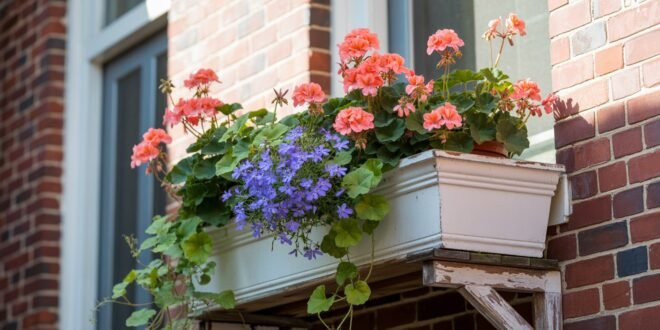Imagine a vine racing five feet down your railing by July—yet you planted it in a shoebox-size window box.
Last summer, my tiny balcony morphed into a perfume bar for butterflies after I swapped plain geraniums for lantana and sky-blue salvia.
Stick with me and you’ll learn three magic moves: pair punchy coral-and-blue blooms for instant curb appeal, weave scented pollinator magnets for buzzing company, and anchor the whole display with evergreen stars that never drop their color.
Ready to splash those bold color combos and watch your windows smile?
Splash Bold Color Combos
Your little railing box can shout louder than a billboard if you load it with daring color. First, we’ll mash hot corals with cool blues for a zing most neighbors only get from neon signs. Then we’ll flip the script and go all–in on moon-white blooms that glow after dark. Two totally different vibes, one tiny box. Grab a drink, crack your window, and let’s paint with petals.
Pair hot corals with cool blues
Coral flowers scream, “Look at me!” Blue ones whisper, “Sure thing—right this way.” Put them side by side and the whole mix snaps into focus. We’ll lean on upright corals as tall stars, fill in with blues in the middle, and let a few bold trailers spill over the front.
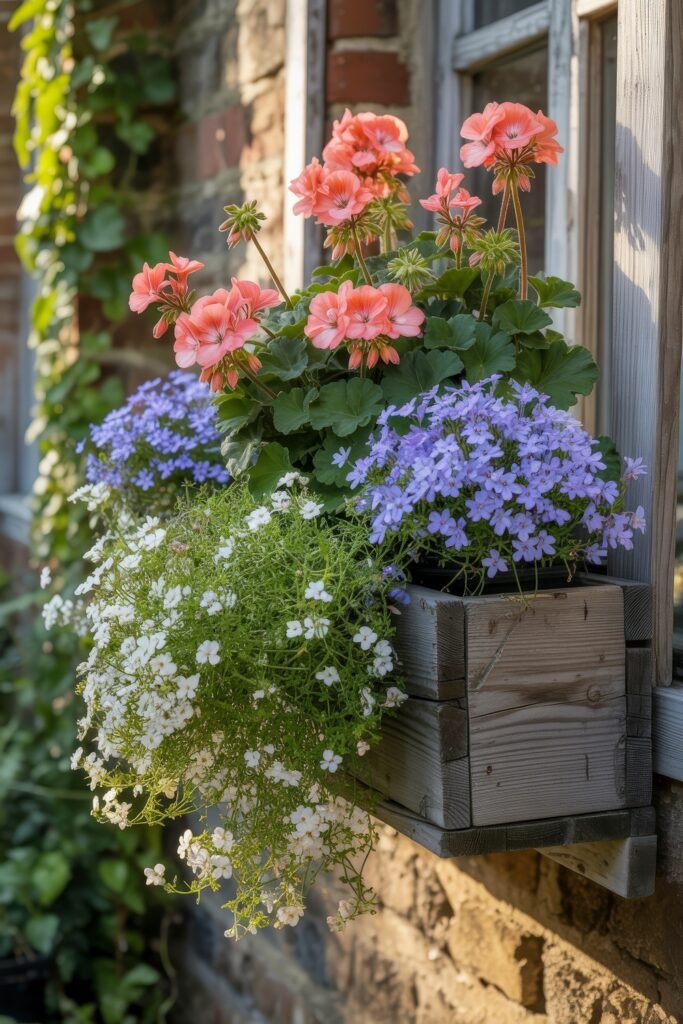


Coral + blue = instant pop
Pick coral geraniums or zinnias for the back row. Their warm petals shine like sunset. Slide in blue lobelia or salvia at mid-height. The cool tones calm the coral heat so nothing feels messy. Even folks walking the dog will glance up because the colors lock eyes with each other.
Add a white “buffer”
Tiny white alyssum or airy euphorbia act like fluffy borders between loud hues. They keep strong reds and blues from blurting together. The white also reflects morning light, making the box look bigger than it is. Bonus: the sweet scent drifts right inside when you crack the window.
Play with texture
Pop in one trailing orange calibrachoa or ‘Campfire’ bidens. Their small trumpets copy the coral shade but change the flower shape. Finish with fuzzy silver licorice plant leaves that set off all the colors like chrome on a bike.
When coral meets blue, you get beach-day energy without leaving home. The mix looks sharp from breakfast to sunset selfies. Better yet, the plan stays neat—great for renters who want drama, not drama-work.
Quick tip: Pinch off spent blooms once a week. New flowers rush in, and you won’t need a replacement show until frost.
Try monochrome moonlight whites
Think of white blooms as mini light bulbs. They bounce every porch light and moonbeam straight back at you. A single color is low-stress and high style—perfect if you’d rather text friends than fuss with color theory.
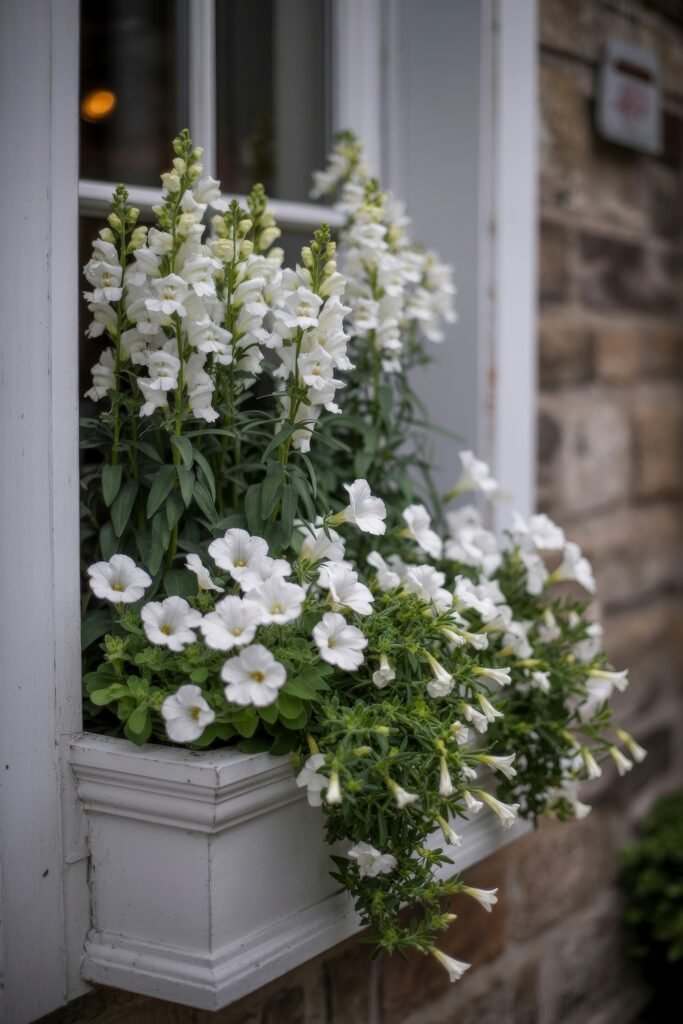
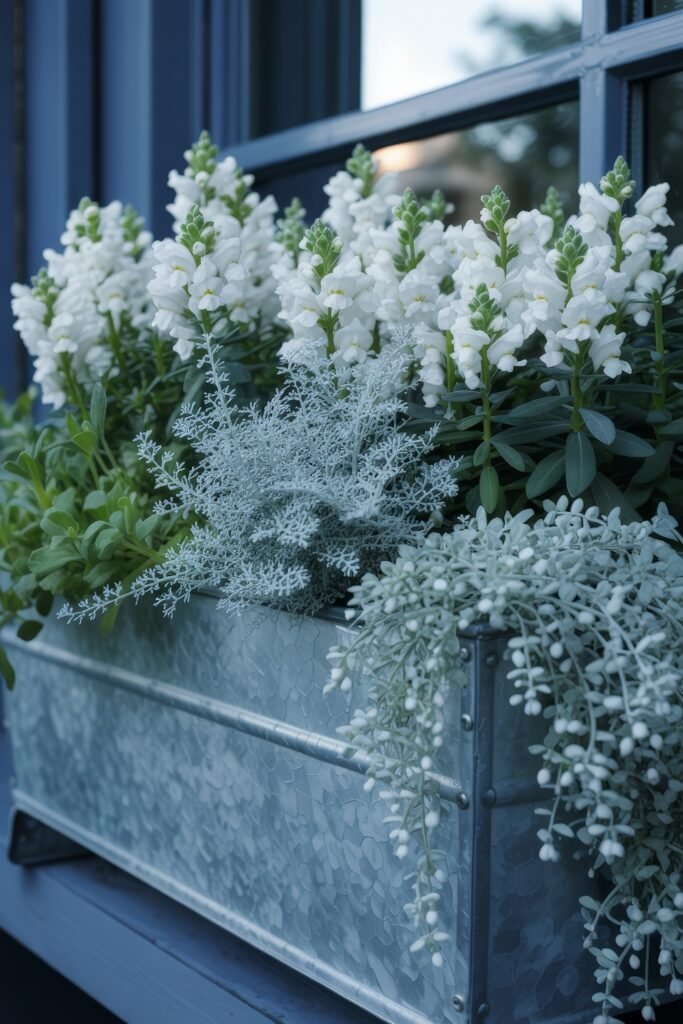
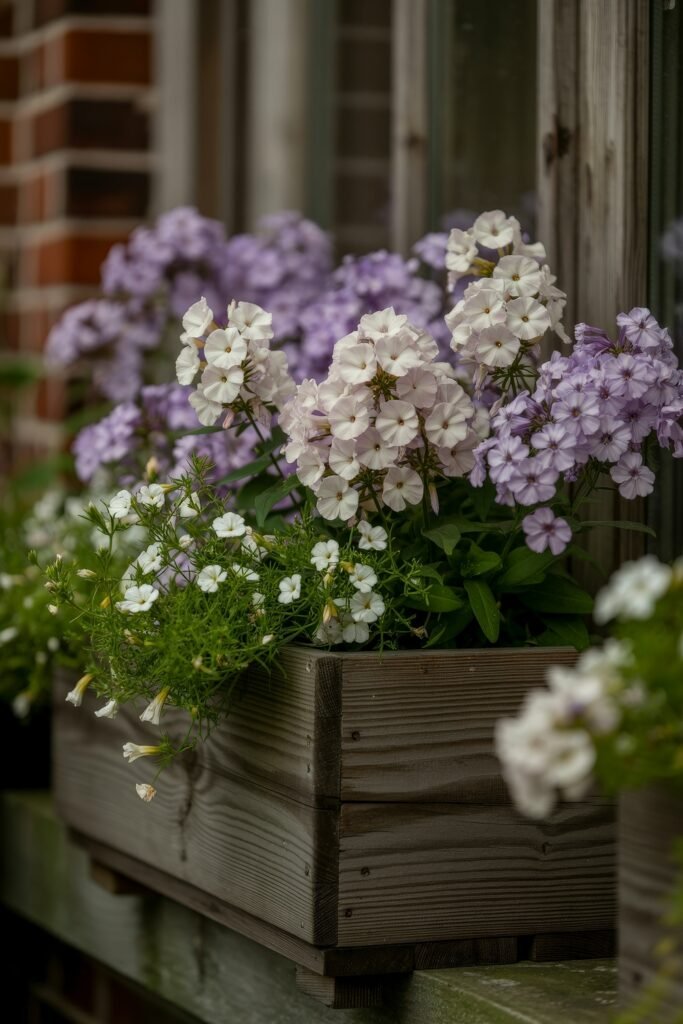
All-white bloom crew
Stuff the planter with white petunias, bacopa, and snapdragons. They wave like clean sheets on a clothesline and hide any gaps fast. Even small breezes make the petals flutter, creating a tiny light show.
Silver sidekicks
Slide in dusty miller, silver dichondra, or variegated licorice plant. The gray leaves act like glitter without the glue. They stop the whites from looking flat and stay handsome even when blooms take a break.
Sneak in scent for night
Night-scented stocks or evening phlox wait till dusk to release vanilla-honey perfume. Plant them near the corners so scent drifts through the open window while you binge your show.
One-color planting is friendly on the wallet and this calm white scheme pairs with any wall paint a landlord throws at you. It’s like swapping in fresh bed sheets—fast, bright, and suddenly the whole place looks cleaner.
How to: Buy flats of white annuals at once. The bulk pack costs less and keeps the color exact across the box.
Apartment payoff: Bold mixes or chill whites—either way, your window box flowers become the balcony’s neon sign. No pricey patio tiles, no landlord approvals, just instant curb joy you can see from the couch.
Savor Fragrant Pollinator Friendly Mixes
Small sill, big buzz. These combos turn a skinny planter into a drive-thru for butterflies by day and a perfume bar by night. First up, a nectar buffet loaded with color and landing pads. After that, night-bloomers that clock in for the late shift while herbs keep things fresh. Ready for winged visitors and sweet breezes? Let’s fly.
Invite butterflies with nectar blooms
Butterflies shop for two things: easy landings and deep nectar wells. Give them both, and they’ll queue like kids at an ice-cream truck. Your colors will stay loud, and you’ll get moving art outside your window.



Cluster flowers for fast finds
Plant lantana or clustered verbena. Their tight flower balls act like bright billboards saying, “Nectar here!” Butterflies can see them from across the street, saving energy on the hunt.
Offer tubular treats
Slide in upright salvia or cuphea. Their tube-shaped blooms hide extra nectar that both butterflies and hummingbirds love. Double the wings equals double the fun to watch.
Build comfy landing pads
Add flat-topped sedum or dwarf allium. Big butterflies need a stable surface. These plants give them a sturdy spot to sip without wobbling in the wind.
Layering tall and low blooms means something is always in reach, even when petals fade. Less fuss for you, more snacks for them.
Pros & Cons: Butterflies are gorgeous but messy eaters. Expect a few fallen petals. Sweep once in a while and enjoy the show.
Breathe evening scent with night flowers
When the sun clocks out, let your planter clock in. Night flowers open and share fragrance just as you’re winding down. Mix them with day-time herbs so scent never takes a break.



Pick after-five bloomers
Night-scented phlox and flowering tobacco unfold at dusk. Their soft perfume drifts into open windows like free incense. Plant a couple, and every evening feels fancy.
Upgrade classic petunias
Choose varieties bred for scent. Deep indigo or pure white types smell like honey and roses. They’re low care and bloom their heads off till frost.
Tag-team with herbs
Line the back with lavender or lemon balm. They give daytime aroma and hand the baton to night flowers after sunset. One planter, 24-hour fragrance.
Your box now works overtime—color by day, scent by night. All the plants like the same well-drained soil, so watering stays simple.
Quick tip: Snip herbs often for cooking. Regular trims keep them bushy and stop night blooms from getting crowded.
Apartment payoff: Pollinator mixes bring life and sweet air to tight city spaces. Open the window, breathe deep, and watch butterflies do the weeding for you.
Layer Trailing Green Waterfalls
No wall space for a trellis? No worries. Let gravity garden for you. We’ll plant quick vines and leafy spillers that drape over edges like living curtains. First comes the speed-demon sweet potato vine, then an ivy-and-petunia duo that plays evergreen meets fireworks. Your railing’s about to get a leafy makeover.
Let sweet potato vine cascade
Sweet potato vine is the garden equivalent of a karaoke star—loud, fast, and impossible to ignore. One cutting can fill a box and then some. It’s perfect for renters who want lush looks yesterday.
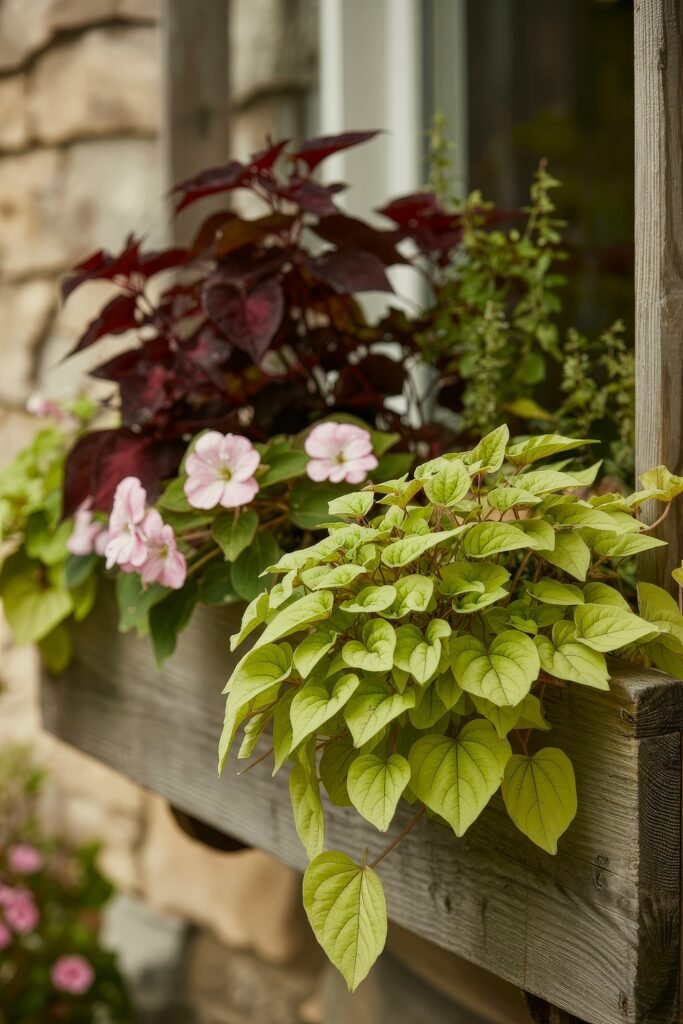
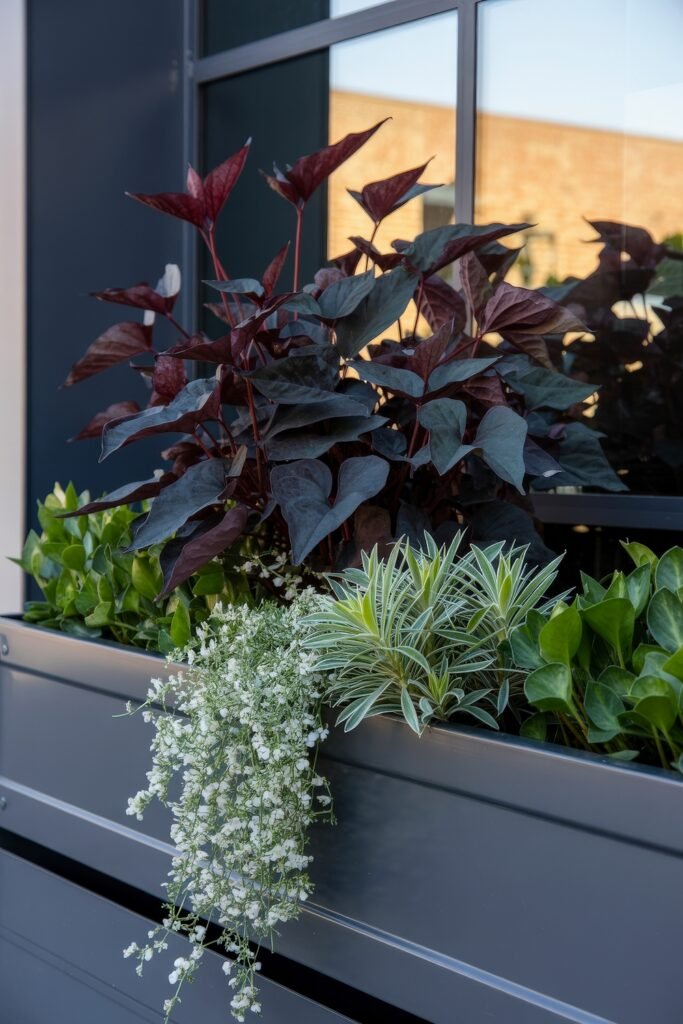

Pick your color
Chartreuse ‘Margarita’ glows like a green highlighter, while burgundy varieties bring deep drama. Choose one and match it with flowers you already love.
Give it room and water
This vine drinks but hates wet feet. Use a roomy box with drainage holes. Water when the top inch feels dry, not before, or the roots sulk.
Pinch for fullness
Snap off the growing tips once. The plant branches out instead of making one long whip. You’ll get a thick waterfall, not a single rope.
In weeks, the vine trails feet past the box, hiding plastic edges and adding jungle vibes without a plane ticket.
How to: Lost track of watering? Leaves wilt to warn you. A drink perks them up within an hour—built-in reminder system!
Combine ivy with petunias for depth
Think of ivy as the steady bass line and petunias as the flashy guitar solo. Together they make music that lasts all year. Ivy keeps green in winter; petunias party all summer.



Use ivy as the frame
Plant English or Swedish ivy at the back edge. Their long stems drape down and anchor soil against wind. They stay green even when snow threatens.
Layer blooming fronts
Pop in mounding petunias or calibrachoa near the soil line. The flowers perch on the ivy curtain, giving instant depth and color.
Swap for shade
Balcony too shady? Trade petunias for white begonias, then tuck a feathery asparagus fern between ivy strands. You still get layers without sunburned leaves.
The combo needs little more than weekly deadheading and water. Meanwhile your planter looks like two seasons got married.
Pros & Cons: Ivy’s roots can hog space, so refresh soil each spring. The payoff is a year-round backdrop no fabric could match.
Apartment payoff: Trailing plants stretch greenery down your wall, claiming space you didn’t know you had. Your window box flowers now work in 3-D.
Refresh Year Round with Evergreen Anchors
Flower power is awesome, but someone needs to hold down the fort in winter. Enter evergreens. We’ll plant pint-size conifers for structure and sprinkle in flashy leaves for cold-season color. Your planter will look “cared for” even when you’re binge-watching in sweatpants.
Tuck dwarf conifers for structure
Dwarf evergreens are like tiny security guards—small but mighty. They stand firm in wind and keep shape when annuals quit.
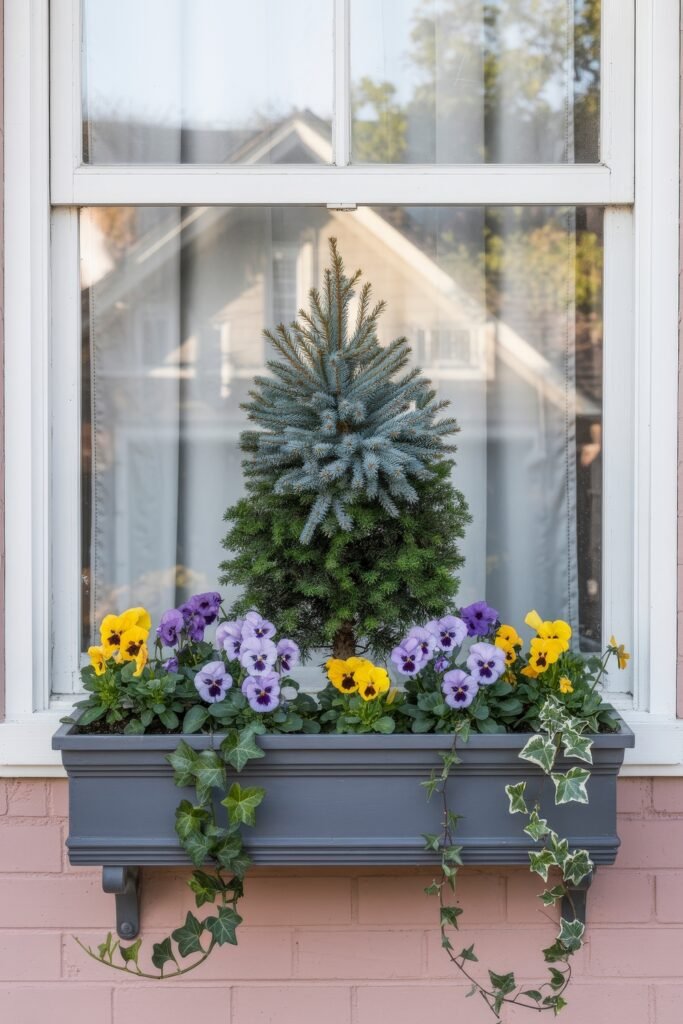

Choose the right mini tree
Dwarf Alberta spruce, mugo pine, or hinoki cypress stay under two feet. Perfect for shallow window boxes without bumping the glass.
Center and ring
Plant one conifer in the middle, then circle it with seasonal color—pansies in spring, coleus in summer. Easy thriller-filler move.
Sun and sip rules
Most minis want half a day of sun and deep but rare watering. Think weekly drink, not daily drench.
One sturdy evergreen cuts wind, frames flowers, and saves you from staring at empty soil in February.
Quick tip: Wrap lights around the mini tree in December. Instant holiday cheer, zero ladder needed.
Add variegated foliage for winter pop
Plain green can feel sleepy in gray months. Variegated leaves splash cream, gold, or pink into the mix and wake things up.



Spot the bright stars
Try variegated euonymus, gold-edged ivy, or evergreen sedge. They shine even under overcast skies and bounce light into dark corners.
Mix in colorful perennials
Heuchera leaves come in burgundy, caramel, or lime. Their ruffles pair well with glossy evergreen herbs like rosemary.
Include surprise blooms
Shade-tough hellebores flower in late winter. They bridge the gap between holiday greens and spring bulbs without extra effort.
Layered leaves and winter blooms turn your box into a living mood board. Snow may fall, but color sticks around.
How to: Tuck silver dusty miller between darker leaves. It looks like frost even when temps stay above freezing.
Apartment payoff: Evergreen anchors mean no bare boxes, no sad balconies. You get structure, color, and scent that roll from one season to the next.
Grow Snackable Herb Edges
Flower boxes can feed you, too. Let’s line the front with herbs that trail, smell amazing, and taste even better. First up is creeping thyme that hides plastic edges like a green fringe. Then we’ll pair basil with marigolds—eye candy that also kicks pests out of the party.
Line fronts with trailing thyme
Trailing thyme is the chill roommate of herbs. It spreads but minds its manners, dangling over edges without hogging space.



Choose a flavor
Lemon thyme smells citrusy; woolly thyme feels fuzzy under fingertips. Pick one or mix both for a multi-sensory win.
Drought? No drama
Thyme comes from rocky hills. Miss a watering, and it shrugs. That’s vacation-proof gardening.
Hidden superpowers
Dense mats of thyme block weeds and annoy deer and some bugs. Flowers and veggies nearby stay safer.
A thyme fringe looks like fancy edging but works like green armor. Snip a bit for pasta, and the plant grows back thicker.
Pros & Cons: Slow grower at first, so be patient. Once rooted, it’s almost impossible to kill—great for forgetful waterers.
Mix basil with marigolds for pests
Basil is the kitchen star; marigolds are the bouncers. Put them together, and bad bugs get bounced.
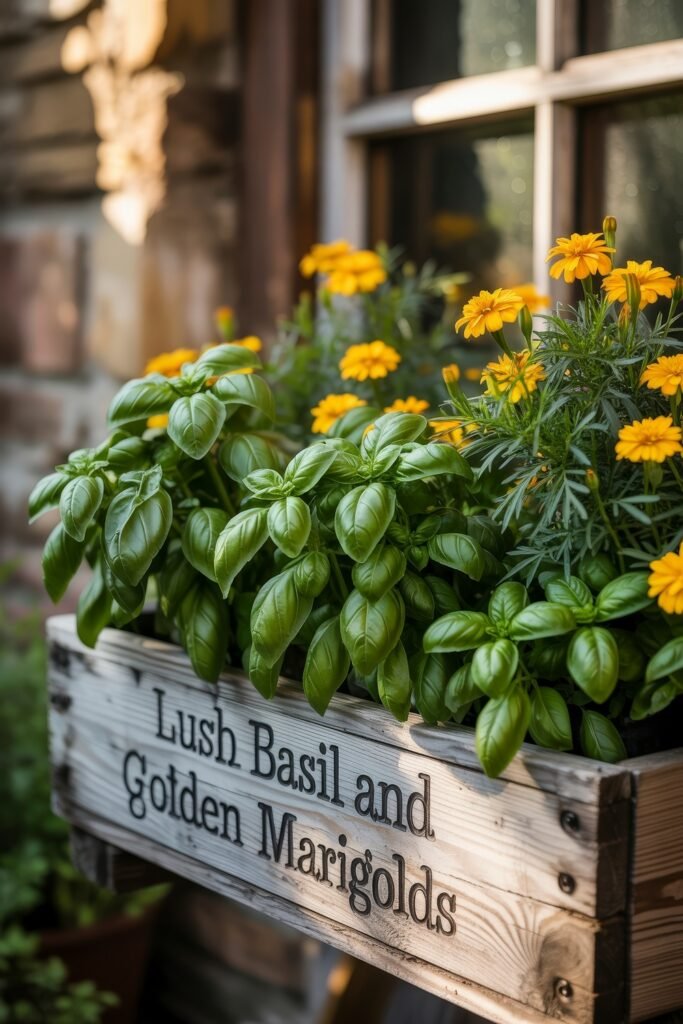
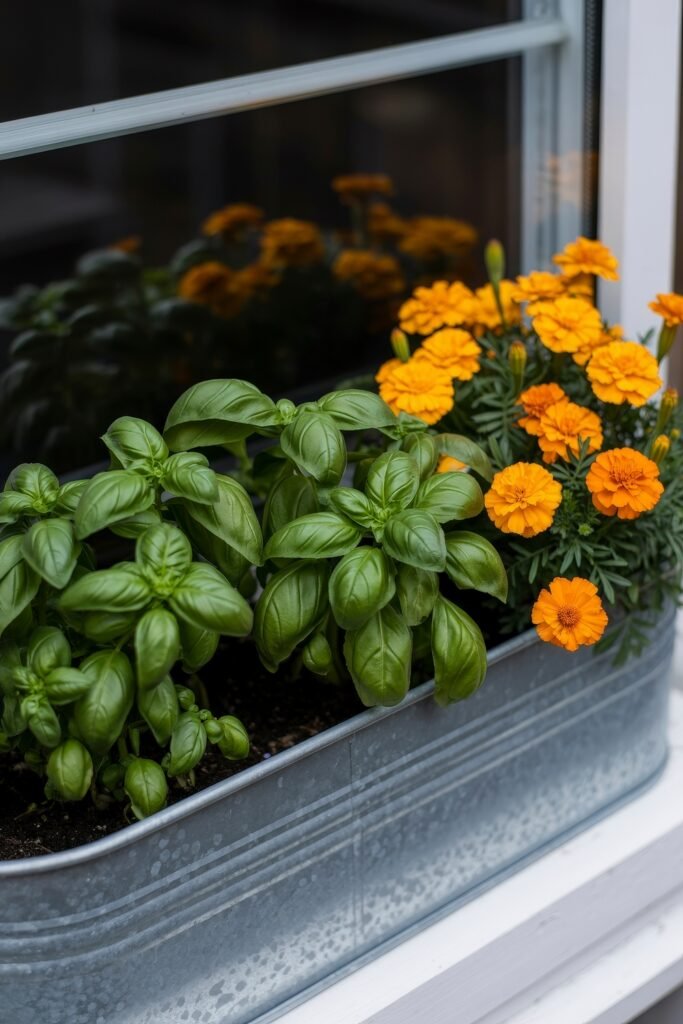
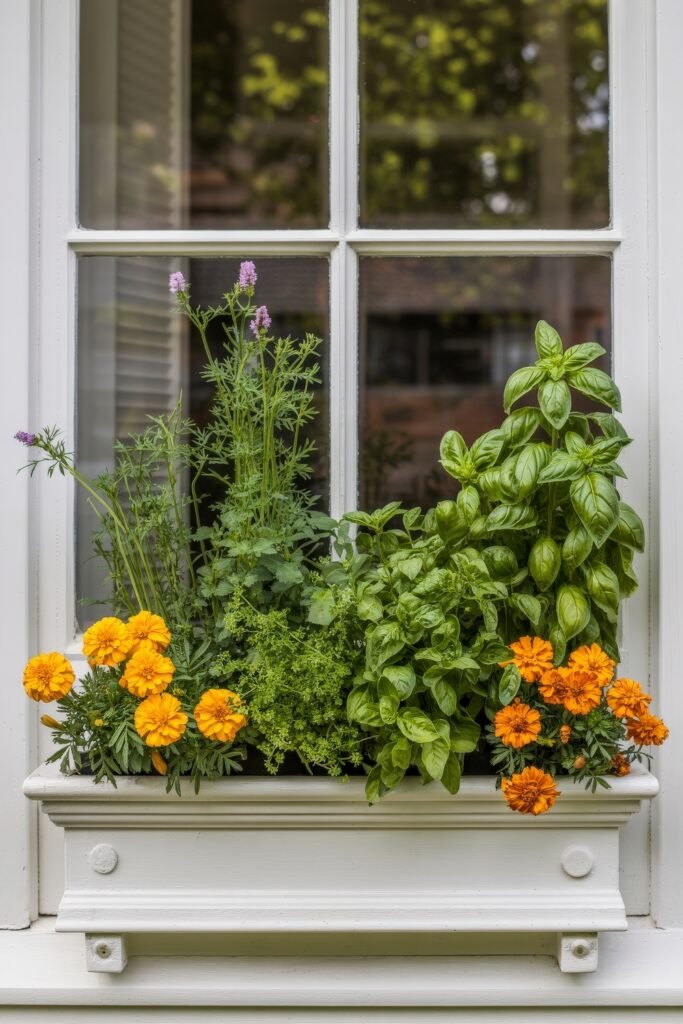
Same sun, same sips
Both plants want six hours of sun and evenly moist soil. Easy care equals happy chef.
Color punch
Golden marigold pom-poms frame basil’s glossy leaves. You get salad greens and bright blooms in one grab.
Natural trap crop
Slugs chew marigold leaves first, sparing basil for your pesto night. Everyone wins except the slugs.
Deadhead marigolds and pinch basil tops weekly. Those two tiny chores keep flowers blooming and basil leafy.
Quick tip: Too much basil? Freeze chopped leaves in ice cube trays with olive oil. Pop out a cube when cooking—summer flavor in January.
Apartment payoff: Herb edges turn window box flowers into a snack station. Fresh taste, nice smell, and built-in pest control—what’s not to love?
Curate Charming Window Box Flowers
Treat your planter like a tiny stage set that changes with the season. We’ll rotate tough stars—pansies, geraniums, mums—so the show never closes. Then we’ll match each little micro-climate on your sill to plants that thrive there. Your landlord may own the bricks, but you own the view.
Rotate seasonal stars from pansies to mums
Plants have favorite weather just like people do. Swap them on cue, and your box looks fresh all year.

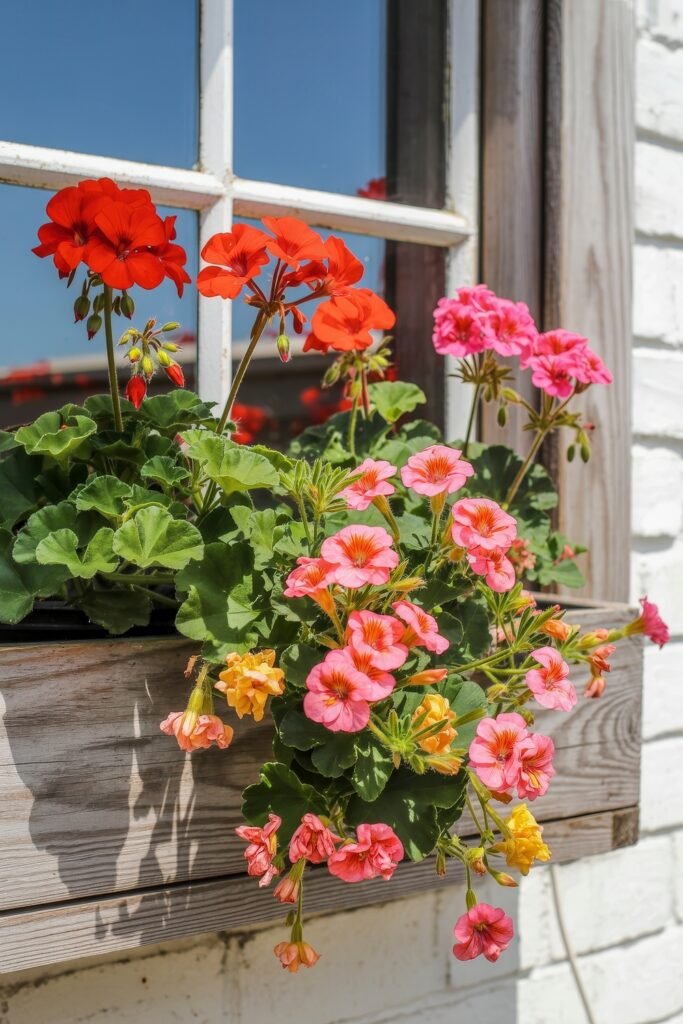

Spring kickoff
Plant pansies, violas, and mini daffodils. They laugh at chilly mornings and bloom before coffee’s done.
Summer heat wave
Switch to geraniums, zinnias, or calibrachoa when temps climb. These flowers love sun that makes you reach for sunscreen.
Fall encore
Cool nights? Slide in cushion mums beside new pansies. Instant harvest vibe with zero hay bales needed.
Changing a few six-packs of plants is easier than repainting a room. Think of it as new throw pillows for your facade.
How to: Keep spare nursery pots on hand. You can pre-grow the next season’s stars on the balcony floor, then swap them in like plug-and-play.
Match microclimates to happy plants
Even one window box has hot spots and shady nooks. Put the right plant in the right pocket and watering gets way easier.



Morning sun lovers
Begonias, impatiens, and coleus enjoy bright light without noon scorch. Park them where dawn hits first.
Heat-proof heroes
South-facing ledges roast. Heat-tough petunias and lantana handle it, blooming like nothing’s wrong.
Wind-tunnel picks
High floor? Choose drought-tough vines with thick leaves that won’t shred. They hold moisture and stay green.
Knowing your box’s mini moods stops plant drama before it starts. Less babysitting, more weekend fun.
Quick tip: One corner getting more sun? Turn the planter a quarter each watering. Growth evens out, and you look like a pro.
Apartment payoff: Curating window box flowers is just smart swapping. Time the cast, know the stage lights, and your balcony becomes a year-round photo backdrop without a single renovation.
Conclusion
Window box flowers sure know how to work overtime.
- Color pop – Coral-and-blue pairings or moonlit whites grab attention from street to selfie.
- Living scent bar – Lantana, salvia, and night-scented phlox keep perfume and pollinators floating day and night.
- Always-green frame – Dwarf spruces and variegated ivy hold shape through frost so boxes never go bare.
Snag a pack of seedlings this weekend and test one tip on your sunniest ledge.
Which combo are you itching to try first—bold colors, trailing vines, or herb edges?
For even more inspo about Window box flowers, hop over to our Pinterest board on Balcony & Terrace Gardening and start pinning!
